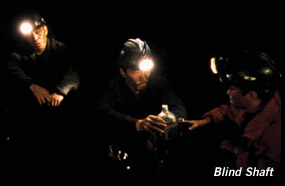This extremely tendentious screed from Bill Gertz in the beloved Moonie Times is going to raise a lot of eyebrows today. It’s practically a declaration of war against China.
China is building its military forces faster than U.S. intelligence and military analysts expected, prompting fears that Beijing will attack Taiwan in the next two years, according to Pentagon officials.
U.S. defense and intelligence officials say all the signs point in one troubling direction: Beijing then will be forced to go to war with the United States, which has vowed to defend Taiwan against a Chinese attack.
China’s military buildup includes an array of new high-technology weapons, such as warships, submarines, missiles and a maneuverable warhead designed to defeat U.S. missile defenses. Recent intelligence reports also show that China has stepped up military exercises involving amphibious assaults, viewed as another sign that it is preparing for an attack on Taiwan.
…The combination of a vibrant centralized economy, growing military and increasingly fervent nationalism has transformed China into what many defense officials view as a fascist state.
“We may be seeing in China the first true fascist society on the model of Nazi Germany, where you have this incredible resource base in a commercial economy with strong nationalism, which the military was able to reach into and ramp up incredible production,” a senior defense official said.
For Pentagon officials, alarm bells have been going off for the past two years as China’s military began rapidly building and buying new troop- and weapon-carrying ships and submarines.
The release of an official Chinese government report in December called the situation on the Taiwan Strait “grim” and said the country’s military could “crush” Taiwan.
A first-rate alarmist, Gertz goes through a laundry list of China’s dazzling new weapons and military capabilities, leaving the reader wondering whether an oil-crazed Beijing isn’t about to invade its oil-rich neighbors later on this week. He also trots out an array of military experts most of us have never heard of, each expressing more angst than the last about the imminent threat China poses to the American Way.
U.S. officials have said two likely targets for China are the Russian Far East, which has vast oil and gas deposits, and Southeast Asia, which also has oil and gas resources.
Michael Pillsbury, a former Pentagon official and specialist on China’s military, said the internal U.S. government debate on the issue and excessive Chinese secrecy about its military buildup “has cost us 10 years to figure out what to do”
“Everybody is starting to acknowledge the hard facts,” Mr. Pillsbury said. “The China military buildup has been accelerating since 1999. As the buildup has gotten worse, China is trying hard to mask it.”
Richard Fisher, vice president of the International Assessment and Strategy Center, said that in 10 years, the Chinese army has shifted from a defensive force to an advanced military soon capable of operations ranging from space warfare to global non-nuclear cruise-missile strikes.
“Let’s all wake up. The post-Cold War peace is over,” Mr. Fisher said. “We are now in an arms race with a new superpower whose goal is to contain and overtake the United States.”
Let me be blunt: This is incendiary propaganda. There is no balance to this piece, no consideration of other viewpoints and absolutely no sense of perspective. By that, I mean looking at it from the Chinese perspective — if they were to do any of the things the article makes us think are imminent, their economy would instantly go to hell in a handbasket.
Just look at this crazed assertion:
“It is their surface-to-air missiles, their [advanced] SAMs and their surface-to-surface missiles, and the precision, more importantly, of those surface-to-surface missiles that provide, obviously, the ability to pinpoint targets that we might have out in the region, or our friends and allies might have,” Gen. Hester said.
The advances give the Chinese military “the ability … to reach out and touch parts of the United States — Guam, Hawaii and the mainland of the United States,” he said.
This leaves the reader with the distinct impression that China threatens US territory. Is this rubbish or what?
Needless to say, Instapuppy sends his lemmings to read this trash just in case they’re not feeling militaristic enough toward China yet.


Comments